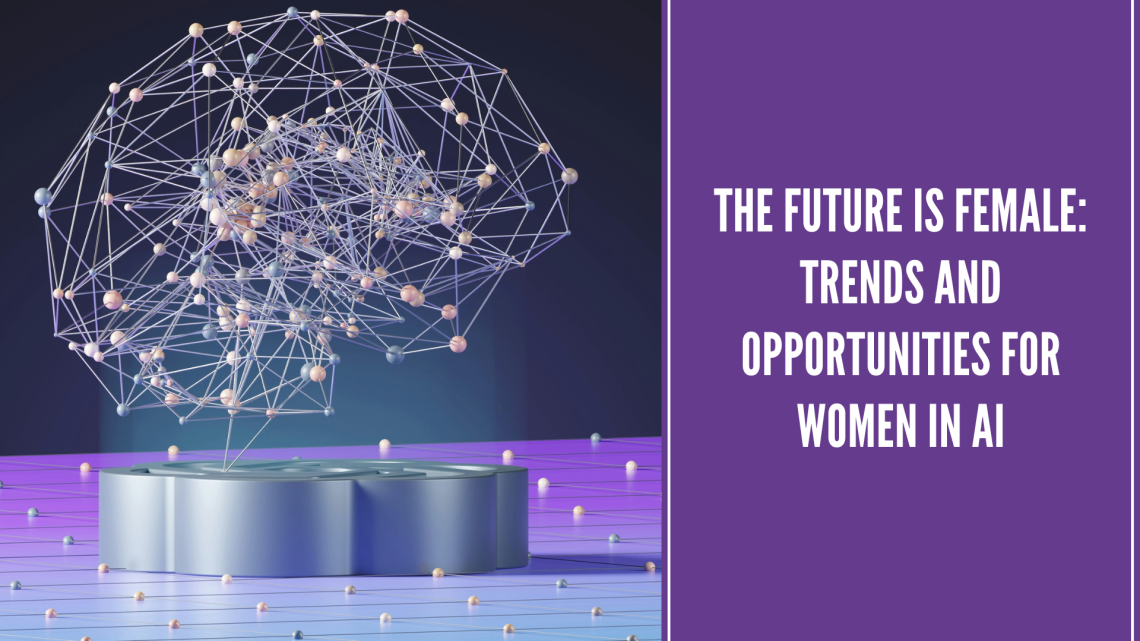
Artificial intelligence (AI) is now at the forefront of technological innovation - and is not going anywhere anytime soon. With this comes a multitude of opportunities for individuals across genders.
While often thought of as male-dominated, the field of AI is evolving rapidly and offers an array of prospects for women who wish to excel in, contribute to, and most importantly shape this dynamic, fast-paced field. With that said, what are the trends and opportunities for women in the dynamic world of AI, and why is it so important they aren’t missed?
Embracing Diversity in AI
In recent years, there has been a growing recognition of the importance of diversity and inclusion in all sectors of work. Many organisations are increasingly prioritising diversity initiatives, and recognising the value that diverse perspectives bring to the development of AI technologies. At least that’s what they should be doing; in some cases, diversity is used as an empty buzzword to hold up a façade - and sometimes, good intentions wield little result.
By actively recruiting and supporting women in AI, organisations can push forward real change, and tap into a broader talent pool to foster a culture of innovation and collaboration. Research has shown that diverse teams are more effective at problem-solving and innovation, making gender diversity a strategic imperative in the field of AI.
Diversity is a cornerstone of innovation, not just in AI but in every sector that exists today. Women bring unique perspectives, experiences, and skills to the field, enriching the discourse and driving creativity. Through gender diversity in AI, we ensure that the technologies developed are inclusive, equitable, and representative of diverse societal needs and values.
We’re used to thinking of machines and technology as entirely unbiased, but that is not the case. If the people developing these technologies have biases, these will be inevitably reflected in the finished product: just last year, a study proved that driverless cars were more likely to hit dark-skinned pedestrians because the AI-powered pedestrian detection systems were trained using predominantly images of fair-skinned individuals. This was not done out of malice, but the consequences may have been dire.
The same issue may present itself in many fields: has the AI been trained to detect skin cancer on dark skin, for example? Has it been trained to recognise the symptoms of an illness as it presents itself in women as opposed to men? Was an accident simulation run with ‘male’ mannequins only, or was a female driver’s average height and weight also considered when designing the car? Would any of it have been different if more people from minorities, and more women, were among those developing the technology?
Diversity brings with it unique insights into the ethical and societal implications of AI, helping reduce the likelihood of the above scenarios. Empowering women in AI is essential for creating a more diverse and inclusive workforce. By embracing diversity in AI, we can create technologies that better serve the needs of all members of society.
Exploring AI Opportunities
Having seen what women can do for AI, let’s move on to what AI can do in terms of career opportunity and workplace equality. In short, what can AI do for women?
There is a strong reason to believe that AI has the potential to drive gender equality by addressing biases and promoting fairness and inclusivity. By leveraging AI-driven solutions in recruitment, workforce management, and decision-making processes, organisations can mitigate biases and create more equitable environments for women. Sounds great, doesn’t it? But this potential needs to be realised, and for that to happen you need… women.
As discussed above, it is essential to ensure that AI technologies are developed and deployed in a manner that is ethical, transparent, and accountable to avoid exacerbating existing inequalities. If AI algorithms are not designed and implemented thoughtfully, they may perpetuate existing biases and discrimination. Companies must take steps to include women in their research and development teams, as well as ensure that AI algorithms are rigorously tested for bias and discrimination before deployment.
Fortunately, there is no shortage of career paths for women to explore in this quickly developing sector: women interested in pursuing a career in AI have a wide array of opportunities to explore. From AI research and data science to engineering and ethics, there are diverse pathways for women to make their mark in the field.
Researcher in AI: Women can contribute to cutting-edge work in machine learning, deep learning, natural language processing, and computer vision as researchers in AI. They can focus on creating new algorithms, enhancing AI models, and refining cutting-edge AI technology.
Expert in Data Science: AI heavily relies on data science. Data scientists use AI approaches to analyse massive databases, glean insightful information, and create prediction models.
Engineer in AI: Women with engineering backgrounds can work as AI engineers. This calls for a focus on creating and implementing AI systems, incorporating AI into applications, and ensuring that AI technologies are used effectively.
Advisory for Ethical AI: Women may choose to specialise in ethical AI consulting given the rising concerns surrounding ethics in AI. They may provide organisations with guidance on creating ethical AI plans and ensuring AI systems are fair, transparent, and accountable.
AI Product Manager: Product managers for AI might be women who possess both technical and managerial abilities. Working closely with cross-functional teams to achieve product success, they may spearhead the creation and introduction of AI-based products.
As the demand for AI talent continues to grow, there is an increasing need for women to enter and succeed in AI-related fields. While women are still underrepresented in many areas of AI, including AI research, engineering, and leadership roles, there is an enormous potential for growth.
Addressing this gender imbalance is a challenge, but it’s one women can tackle successfully to create a seismic shift that may forever change the world - for the better.






